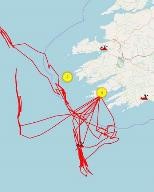Compliance with the Landing Obligation will require significant changes to existing fishing practices. One of the highest risks of non-compliance is the continued practice of illegal discarding of species which fishers are obliged to land. While there are several ways to monitor fishing operations in order to verify compliance, such as the self-reported Electronic Recording Systems (ERS) data, and conventional at-sea and landing inspections, it is proposed that Remote Electronic Systems (REM) that utilise CCTV cameras should be explored to ensure compliance with Article 15 of the CFP. In support of the LO, REM systems can be used to document if discarding takes place and ensure compliance with the Landing Obligation. With the introduction of REM/CCTV monitoring on board fishing vessels the implementation of the LO is supported through the following:
- The capture and recording of all fishing events including those directly related to LO;
- The identification of non-compliant behaviour while at sea;
- A deterrent to illegal activity in relation to the landing obligation;
- A more cost effective monitoring tool than through the use of observers on board fishing vessels.
The SFPA has entered into a service contract with MRAG and partners which will include a review, assessment and pilot of the technical and practical implications of installing and monitoring CCTV footage as a means of verifying catch records on board vessels targeting pelagic species. It should also address and resolve data protection and privacy level concerns.

